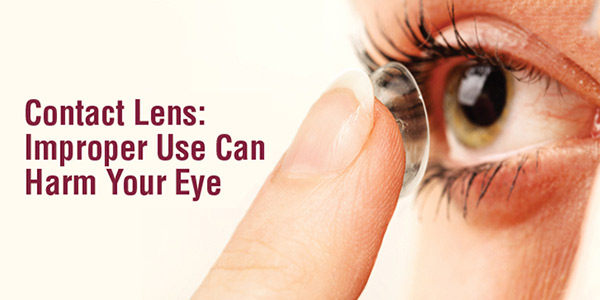Many people these days choose contact lens instead of spectacles irrespective of their age. It is benefiting nearly million of people every day. The beauty of eyes, which it retains, is quite appreciable. Latest advancement is the availability of decorative contact lenses which change the eye color of the wearers. But you need to know certain facts about the use of contact lenses to be safe.
[the_ad id=”14222″]
If used as directed, contact lenses are safe and effective to correct vision problems. But the real trouble pops up if this fancy piece is not worn or cared for properly. If you are planning to get a pair of these lenses or already using one, then it is advisable to know the problems with their improper use.
Am I handling my contact lens properly?
If you are not sure whether you are using your contact lenses in the right way, check through the below list. The most common mistakes observed with use of contact lens are:
- Wearing the lenses for an extended period although they are not approved for such long time.
- Wearing the contact lenses beyond their prescription instead of replacing them with the new ones. This can increase the risk of eye problems and the related complications.
- Napping wearing lenses or overnight wear can increase the risk of infection by nearly 6 to 8 times as per the CDC reports.
The other misuse approaches found with some users are:
- Wearing lenses while swimming
- Storing lenses in water instead of the solution prescribed by the doctor. Some people also top off or add new solution to the left-over, old solution that is sitting in the case. This reduces the germ-killing power of the solution.
- Using expired products
What are the possible risks of improper use?
Infections
Improper use can increase the risk of certain infections. The most common pathogens causing infections include Staphylococcus, Pseudomonas, Acanthamoeba, and Fusarium as per the reports of CDC. These infections can be minor or can cause long-lasting eye damage which is painful and disrupting. Nearly 1 in 5 patients with infections had a scarred cornea, required a corneal transplant, or suffered a reduced vision.
The affected individuals may have unusual redness and pain in the eye, blurred vision, increased light sensitivity, tearing or discharge from the eye and a feeling of having something in the eyes. Some of the infections can lead to serious vision loss or even blindness in extreme cases.
Keratitis is the most common and serious infection associated with the misuse of contact lenses. It involves the pain and inflammation of the cornea which is a dome-shaped covering of the iris and pupil of the eye. If it is left untreated, causes scarring and interferes with the vision. In severe cases, it may also lead to blindness.
Corneal ulcers and abrasions
Contact lens misuse can lead to corneal ulcers as a result of eye irritation with the lenses. Corneal ulcers can result in the clouding, thinning or perforation of the cornea. This can lead to poor vision or corneal blindness. You may have to undergo a corneal transplant to restore vision and save your eyes.
How can I be safe?
By being little cautious, you can prevent a bigger damage to your eyes with contact lenses.
- Wash your hands with soap and water before handling the contact lenses.
- Remove the contact lenses before going to bed, showering or swimming.
- Rub and rinse the contacts in the disinfecting solution after removing them out of your eyes.
- Rub and rinse the lens case with prescribed solution, dry it, and keep it upside down with the caps open.
- Replace the lens cases at least every three months.
Contact lenses are an excellent invention for vision correction when used in the correct way. It is quite important for the user to know the do’s and don’ts of wearing them. Otherwise, you may have to make bigger sacrifices in the name of a temporary aesthetic appearance. Take easy measures to avoid these preventable risky behaviors. Be wise in handling the contact lenses; safeguard your eyes while not sacrificing their beauty with the use of spectacles.

